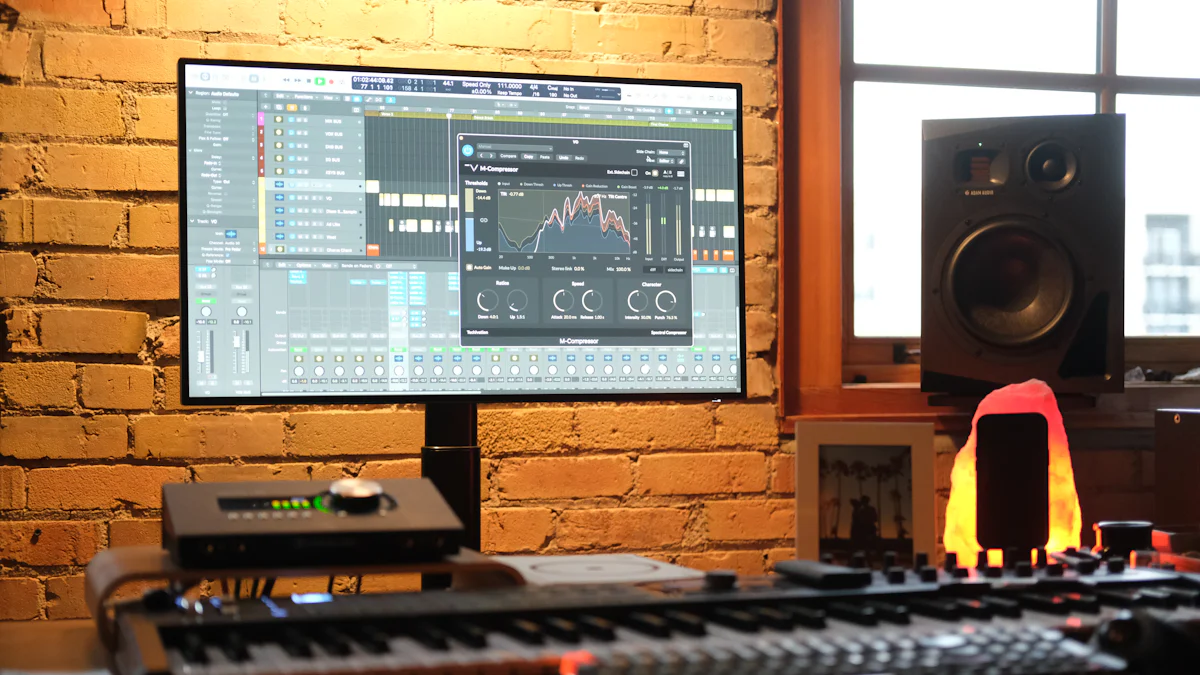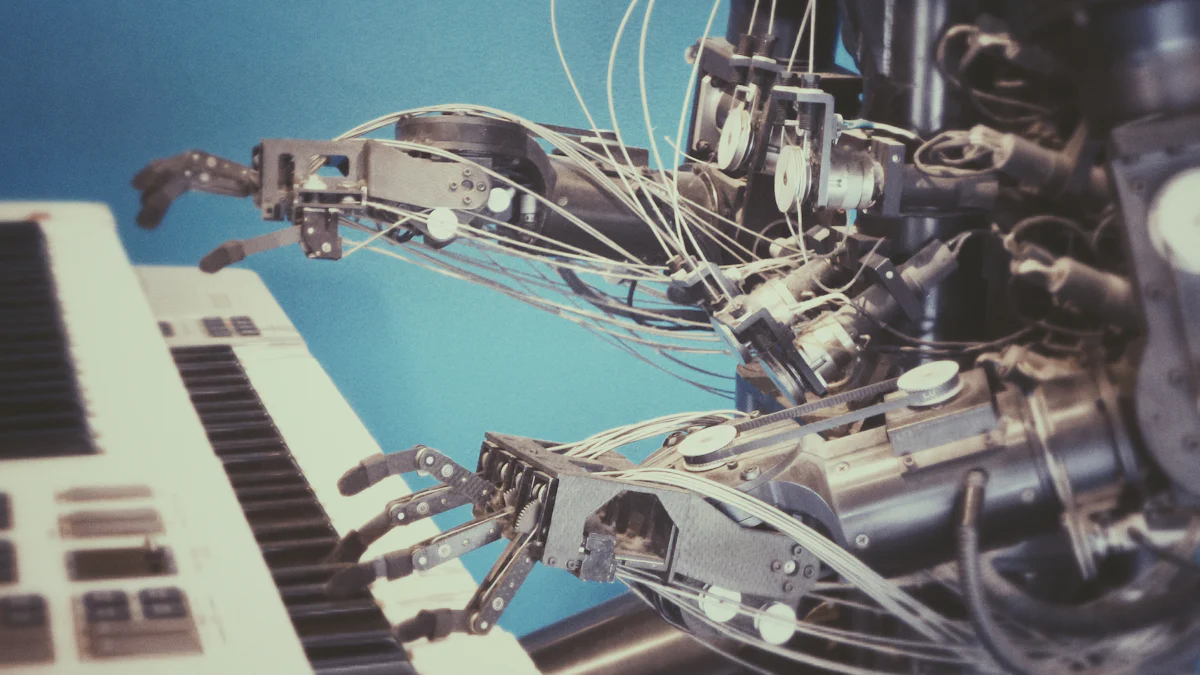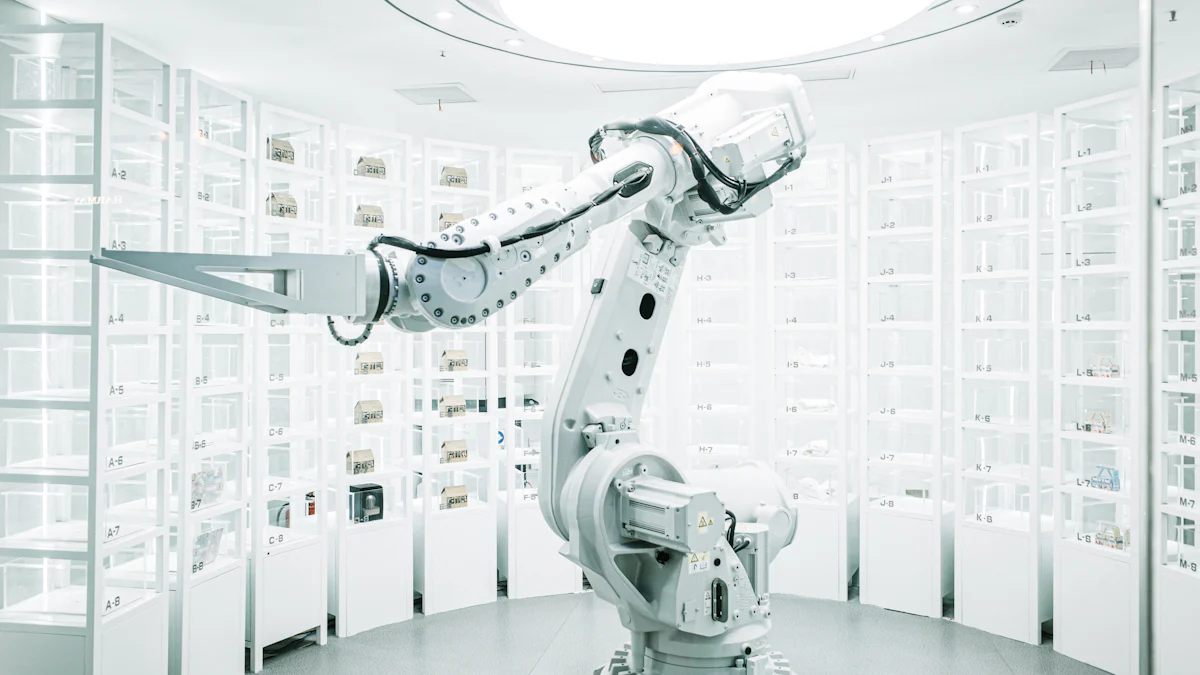How Musicians Use AI to Inspire New Tracks

You might wonder how Musicians Use AI to create new tracks. AI technology is revolutionizing the music industry by transforming how artists compose and produce music. Imagine AI music generators using machine learning algorithms to analyze existing tunes and craft fresh compositions. This innovation opens up endless possibilities, allowing musicians to break free from creative blocks and explore new musical directions. AI doesn't just enhance music composition; it also streamlines production processes, making it easier for you to create high-quality tracks. As AI continues to evolve, its role in music creation becomes increasingly vital.
The Role of AI in Music Creation

AI as a Creative Partner
AI has become an invaluable partner for musicians, offering fresh perspectives and innovative solutions. When you face a creative block, AI can help you generate melodies and harmonies that might not have crossed your mind. By analyzing vast datasets of music, AI systems identify patterns and styles, allowing you to explore new musical territories. This collaboration often pushes the boundaries of genre conventions, giving birth to unique compositions.
Generating Melodies and Harmonies
Imagine having a tool that suggests melodies and harmonies based on your initial ideas. Musicians use AI to do just that. These systems analyze existing music and create new sounds, helping you craft tunes that resonate with your artistic vision. AI-generated music, created entirely by algorithms, offers a fresh take on traditional composition methods. You can experiment with different styles and genres, expanding your musical repertoire.
Assisting in Lyric Writing
Writing lyrics can be a daunting task, but AI is here to lend a hand. Musicians use AI to overcome writer's block and generate lyrics that fit their themes and emotions. Applications like Jasper and Rytr provide suggestions and ideas, making the lyric-writing process more efficient. With AI's assistance, you can focus on expressing your creativity without getting bogged down by the mechanics of writing.
AI in Music Production
AI doesn't stop at composition; it also plays a crucial role in music production. By enhancing sound quality and automating tedious tasks, AI allows you to focus on the creative aspects of your work. Embrace AI as a collaborator in your artistic journey, shaping a diverse and innovative soundscape.
Enhancing Sound Quality
Sound quality is paramount in music production, and AI technology excels in this area. Musicians use AI to refine their tracks, ensuring each note and beat sounds perfect. AI algorithms analyze your music and make adjustments to enhance clarity and depth. This results in a polished final product that captures your artistic intent.
Automating Mixing and Mastering
Mixing and mastering can be time-consuming, but AI streamlines these processes. Musicians use AI to automate tasks like balancing audio levels and applying effects. This not only saves time but also ensures consistency across your tracks. With AI handling the technical details, you can focus on what you do best—creating music that moves and inspires.
Democratization of Music Through AI
AI is leveling the playing field in the music industry, making it easier for independent artists like you to create and share your music. This section explores how AI is transforming accessibility and bridging cultural and genre gaps.
Accessibility for Independent Artists
AI offers a treasure trove of tools that empower you to produce music without breaking the bank. These tools are not only cost-effective but also incredibly innovative, opening up new possibilities for your music creation journey.
Cost-Effective Production Tools
Imagine having access to advanced production tools that were once only available to big-budget studios. Now, AI makes this possible. You can use AI-driven software to compose, mix, and master your tracks at a fraction of the cost. This democratization means you can focus on your creativity without worrying about financial constraints. AI music generators, for instance, allow you to create entire tracks by analyzing existing music and generating new compositions. This technology is a game changer for independent artists, providing you with the resources to compete with major players in the industry.
AI-Powered Music Platforms
AI-powered platforms are revolutionizing how you distribute and promote your music. These platforms analyze listener preferences and curate playlists that introduce your music to new audiences. By leveraging AI, you can reach listeners worldwide, expanding your fan base without the need for traditional marketing methods. This accessibility ensures that your music gets the attention it deserves, regardless of your budget or location.
Bridging Cultural and Genre Gaps
AI doesn't just make music production more accessible; it also fosters collaboration across cultures and genres. This technology helps you explore new musical territories and connect with artists from diverse backgrounds.
Cross-Genre Collaborations
Musicians use AI to break down genre barriers and collaborate in ways that were previously unimaginable. AI analyzes different musical styles and suggests ways to blend them, allowing you to create unique cross-genre tracks. This opens up exciting opportunities for collaboration, enabling you to work with artists from various genres and cultures. By embracing AI, you can push the boundaries of your music and create something truly original.
Global Music Trends
AI keeps you in tune with global music trends, helping you stay relevant in an ever-evolving industry. By analyzing data from around the world, AI identifies emerging trends and suggests ways to incorporate them into your music. This insight allows you to adapt your style and stay ahead of the curve, ensuring your music resonates with audiences everywhere. With AI as your guide, you can navigate the complex landscape of global music trends and make your mark on the world stage.
Ethical Considerations in AI-Driven Music
Ownership and Copyright Issues
AI-generated music brings up some big questions about who owns what. When you create music with AI, who gets the credit? This is a hot topic in the music world right now.
AI-Generated Content Rights
You might wonder if AI-generated music should have the same rights as music made by humans. Some people think that AI music should be treated like any other creative work. Others argue that since a machine made it, it shouldn't have the same rights. This debate is important because it affects how you can use AI music and who gets paid for it.
Protecting Originality
Originality is a big deal in music. You want your music to stand out and be unique. But when AI creates music, it can sometimes sound similar to existing songs. This raises concerns about plagiarism. You need to make sure that your AI-generated music doesn't copy someone else's work. It's all about finding a balance between using AI as a tool and keeping your music original.
Bias and Representation in AI Models
AI models can sometimes have biases. This means they might not represent all types of music or artists equally. It's important to be aware of this when you're using AI in your music.
Addressing Algorithmic Bias
AI systems learn from data. If the data is biased, the AI will be too. This can lead to unfair representation in music. For example, if an AI is trained mostly on Western music, it might not do a good job with other styles. You need to make sure that the AI you use is trained on diverse data. This helps ensure that your music is inclusive and represents different cultures and genres.
Ensuring Diverse Representation
Diversity in music is crucial. You want your music to reflect different voices and perspectives. AI can help with this, but only if it's used correctly. By choosing AI tools that prioritize diversity, you can create music that resonates with a wide audience. This not only enriches your music but also helps break down barriers in the industry.
Case Studies and Real-World Examples

Successful AI-Musician Collaborations
Musicians use AI to push the boundaries of creativity, and several notable projects highlight this exciting collaboration. One such project is Taryn Southern's album 'I AM AI', which was composed using Amper Music, an AI-driven platform. This album stands as a testament to how musicians use AI to craft innovative compositions that blend human creativity with machine intelligence.
Another fascinating example is Aiva, an AI virtual artist recognized by SACEM, the French professional association collecting payments for artists. Aiva's recognition underscores the growing acceptance of AI in the music industry. It shows how musicians use AI not just as a tool but as a creative partner capable of producing original compositions.
Notable Projects and Albums
'I AM AI' by Taryn Southern: This album showcases how musicians use AI to compose music that resonates with audiences. By leveraging AI's capabilities, Taryn Southern created tracks that are both innovative and emotionally engaging.
Aiva's Compositions: As an AI recognized by SACEM, Aiva demonstrates the potential of AI-generated music. Musicians use AI like Aiva to explore new musical landscapes and produce compositions that might not have been possible through traditional methods.
Artist Testimonials
Artists who have embraced AI often share positive experiences. They find that AI helps them overcome creative blocks and explore new musical directions. Many musicians use AI to generate fresh ideas and enhance their creative process. These testimonials highlight the collaborative nature of AI, where technology complements human creativity rather than replacing it.
AI-Driven Music Startups
The rise of AI-driven music startups is transforming the industry landscape. These companies provide innovative solutions that empower musicians to create, produce, and distribute music more efficiently.
Innovative Companies
Amper Music: This startup offers AI-powered tools that help musicians compose music quickly and easily. Musicians use AI from Amper to generate melodies, harmonies, and even entire tracks, allowing them to focus on their artistic vision.
Aiva Technologies: Known for its AI composer, Aiva Technologies provides musicians with tools to create original compositions. Musicians use AI from Aiva to experiment with different styles and genres, expanding their creative horizons.
Market Impact
AI-driven music startups are making a significant impact on the market. They democratize music creation by providing affordable and accessible tools for musicians of all levels. As more musicians use AI, the industry sees a surge in innovative music that challenges traditional norms. This shift not only benefits artists but also enriches the listening experience for audiences worldwide.
Future Implications of AI in Music
Evolving Music Industry Landscape
AI is reshaping the music industry, and you can expect some exciting changes ahead. As musicians use AI more frequently, the landscape of the industry evolves, offering new opportunities and challenges.
New Business Models
AI is paving the way for innovative business models in the music industry. You might find that traditional revenue streams, like album sales and concert tickets, are no longer the only options. AI-driven platforms can help you monetize your music in new ways. For instance, AI can analyze listener data to create personalized experiences, which can lead to subscription-based services or exclusive content offerings. This shift allows you to connect with your audience on a deeper level and explore diverse revenue streams.
Changing Roles of Musicians
The role of musicians is changing as AI becomes more integrated into the creative process. You might find yourself collaborating with AI as a creative partner, rather than just a tool. This collaboration can enhance your creativity and push the boundaries of what you can achieve. As musicians use AI, they often take on new roles, such as curators or producers, focusing on the artistic vision while AI handles technical tasks. This evolution allows you to explore new musical directions and redefine your role in the industry.
Predictions for AI's Role in Music
Looking ahead, AI's influence on music will continue to grow. You can expect technological advancements and cultural shifts that will shape the future of music creation and consumption.
Technological Advancements
AI technology is advancing rapidly, and you can anticipate even more sophisticated tools for music creation. These advancements will enable you to experiment with new sounds and styles, pushing the boundaries of traditional music genres. AI algorithms will become more intuitive, allowing you to interact with them in more natural and creative ways. As musicians use AI, they will have access to cutting-edge tools that enhance their artistic capabilities and streamline the production process.
Long-Term Cultural Impact
AI's impact on music extends beyond technology; it also influences culture. As musicians use AI to create innovative compositions, they contribute to a cultural shift in how music is perceived and consumed. You might notice that AI-generated music becomes more accepted and appreciated, leading to a broader range of musical styles and genres. This cultural impact will shape the future of music, encouraging diversity and inclusivity in the industry. By embracing AI, you can be part of this exciting transformation and help redefine the cultural landscape of music.
AI's influence on music creation is undeniable. It acts as a creative partner, helping you break through creative blocks and explore new musical territories. The future of AI in the music industry looks promising. You can expect more sophisticated tools that will redefine how you compose and produce music. AI's potential to inspire new musical directions is vast. By embracing AI, you can push the boundaries of genre and style, creating compositions that resonate with audiences worldwide. As you continue your musical journey, AI offers endless possibilities for innovation and creativity.
See Also
Utilizing AI to Create Music Compositions
Authors Partnering with AI for Innovative Writing
The Impact of AI on Artistic Revolution
